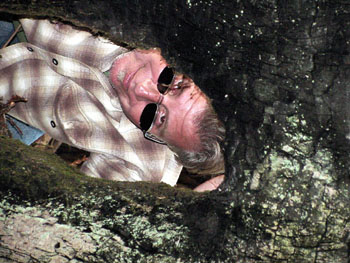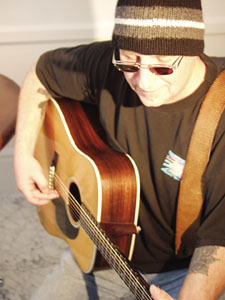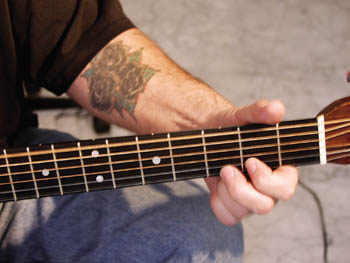![[Metroactive Features]](/features/gifs/feat468.gif)
[ Features Index | Santa Cruz Week | SantaCruz Home | Archives ]

Photographs by Greg Pio Knotty Knotty: There's being one with the trees, and then there's being one with the trees. The Kids Are All White Local musician David Beaudry takes his acclaimed gang-prevention work in a controversial direction, reaching out to white-supremacist kids and granting Metro Santa Cruz a truly shocking interview By Sarah Phelan It's not every day you get truly shocked by an interview. Shocked by someone's revelations? Yes. But by their neighbor's electric fence? Yet that's precisely what happened during a recent interview with nationally renowned Santa Cruz songwriter and musician David Beaudry. Maybe it was the sacred grove we'd just visited in the Boulder Creek hills that Beaudry currently calls home, or the details of his gangbanging, heroin-shooting past and his efforts to help youth in gangs, including white priders, but when we stopped to pet the horses in his neighbor's field, my mind was most definitely not on the electric fence--which is how my nose got shocked. "That shock you got to the nose could probably have killed a bird," said an incensed Beaudry, pointing at a lifeless finch lying only inches from my feet. It's a detail that one day may find its way into one of the many songs that come in to land daily at the "song farm," as he likes to describe his mobile home, which is perched hawklike on a redwood-covered hillside in the San Lorenzo Valley. But modest though this tin shack of an abode is, it currently serves a priceless function for the youth who visit Beaudry here, kids who are questioning their involvement in violence and gangs--including the white supremacist groups that riddle these meth-addled hills. But just why would any self-respecting gangbanger make the trek to the top of this mountain to visit a guitar-wielding songster and his dog? Because Beaudry knows where these kids are coming from--and where they are potentially headed. A former heroin addict and founding member of the Echo Park gang in East L.A., Beaudry's lifestyle landed him in the California Youth Authority, a rock-bottom moment that led to his becoming a touring musician, community activist and Christian pastor--though more recently, he's turned his back on the church and is exploring his Druid/Celtic roots, instead. "I hate to bash the church, but it's a place now that doesn't have much to offer the kids I work with," says Beaudry as we return to his mobile home, following the nose shock-and-awe incident. We climb the stairs to his deck, a cactus grower's paradise, which also houses a small table weighed down with a huge crystal, a piece of charcoal and a pile of books that includes The Druids, The Study of Runes, and The Life of Lifer. "I've been reading a lot of William Blake," says Beaudry, rifling through the books until he finds Blake's Complete Poems. "The man was a genius, who said the gift of the vision poets, the real poets, is passed on through the bloodlines. I come from these lines, I'm totally embracing those lines. Yeah, that mantle's been handed me, and I'm putting that power into my music, because I believe it's better to light a candle than cower in the darkness." But for some who know Beaudry's work as an outreach coordinator for Barridos Unidos--work that helped win him a United Way Community Hero award last year--the news that he's now working with white priders may sound as if he's gone back to the dark side. "I had one person get so mad, she cried, 'How could you?' My answer was, 'Don't you think somebody needs to work with them?' Others have told me about lawyers who have successfully sued the Aryan Brotherhood and I say, 'Whoa! I don't want to sue them, I want to understand them and their pride.' Unlike the Latino cultures, for people of European descent it's like they're not supposed to have a culture. There's a lot of inherited guilt. But these kids don't need that laid on them. They didn't do it, but they respond to that guilt by being angry and joining gangs," he says. Which is where the Druids and the Celts come in.
Culture Shock Beaudry says that just as there are groups using culture to reach kids in Latino gangs, he's trying to do the same for white kids who are beginning to wonder whether looking for their pride and culture in a supremacist group is the right way to go. "Given that white people are originally descended from the Celts and Druids, I'm asking the spirits, the guiding forces that gave the Druids their stuff, to teach me, so I can follow their ways, and do it in a good way that helps the kids. The young adults I work with are longing for forgiveness--a lot have done stuff that's horrible. I tell them, 'You do have something to be proud of. I don't want you to quit being warriors. I want you to do spiritual battle for the kids.'" Though Beaudry may be one of the rare few willing and able to mentor white supremacist youth, he's not alone in his dedication to youth development and violence intervention in the valley. His current work is being carried out under the auspices of the newly founded For the People, a group that formed to work with youth of all cultures, who are trying to break the cycle of gang violence, but who are currently falling through cracks in the system. And lest anyone suspect that Beaudry's really a closet Ku Klux Klanner, it's worth noting that For The People's board also includes Linda Crouse, Wanda Conway Knight, Carmen Perez and Jenna Collier--a veritable who's who of multicultural community activism. Add to that For the People's circle of elders--which includes Manuel Martinez of Barridos Unidos, Apache healer Teresa Jaurez, Poet and Patriot owner Chris Mathews, Grandma Sue, Community TV producer Jim Mason, Calvary Chapel minister Peter Rich and Heavenly Cafe owner Bob Blonder--and it's clear that far from trying to incite racial hatred, Beaudry and For the People are simply trying to find a healthier alternative to what already exists in the way of white pride in these hills--and beyond. "A lot of these kids have drug-addicted relatives in the Ku Klux Klan, the American Nazi party and the Aryan Brotherhood," says Beaudry, recalling how he was on his way to San Jose State University to talk about this work when he picked up a kid hitchhiking through the San Lorenzo Valley. "Turns out this kid's dad, who's just out of prison, is in the Aryan Brotherhood, and several of his friends have just gone to prison, so he was worried his friends might get into deeper trouble because of things they might have to do inside," says Beaudry, who promised the youth he'd help him find his friends inside and work something out. "My point is that everyone is entitled to understand their cultural roots and get strength from them," says Beaudry, noting that while he met with some resistance at his SJSU talk, in the end even his staunchest critics were won over by the need for this kind of work. "Whenever kids come to me, whatever their gang affiliations, we spend one-on-one time, and I find them the perfect mentors. It's always me to begin with, and sometimes they continue with me, but I love to spread the work and connections about," he says. "Going on tour playing music spreads my youth development work even further afield." He pulls out a Martin guitar to play the first song he composed after a yearlong drought that began when his mother died five years ago. "This isn't the guitar I wrote this song on. That one was broken in an unfortunate incident involving a bottle of Bushmills and a very angry woman," says Beaudry, as he launches into "One Last Trace," a song that neatly illustrates his mother's and his Cajun French/Louisiana influences--a style that apparently appeals to all the kids he counsels. "The white pride kids are into death metal, the Latino gangstas are more into rap and hip-hop, but they all seem to like this mix which is Cajun, danceable and wacky and which the KPIG folks go nuts for." The song over, Beaudry picks up the book on Druids and asks if I believe in them, given my own Celtic roots. I tell him how my father used to tell us kids that the Druids went into the trees to escape the Christians, a theory that seemed plausible given the facelike burls and twisted limbs of England's ancient oaks, trees that Druids considered keepers of memories and especially sacred. "Me, I came up on this mountain and it feels as if the land teaches me," says Beaudry, whose mobile home is flanked by an awesome oak, complete with hawk's nest. "A lot of people claim the spiritual path, but to me a lot of it's just selfish, but maybe that's because of the way I was brought up, with my whole family active in the community." Beaudry says he tells the kids he works with, "I don't want to look in a pine box and see them there." "It's heartbreaking, it's not acceptable to lose any more young kids to death or prison, so I'm trying to find ways to pull them out of the fire," he says. "But some people in the community are already getting me wrong. I might say something that makes it seem like I'm into white pride, but I think the people I'm working with have the same rights to be proud of that culture, which didn't just start with the Pilgrims, who are simply a piece of our people. If the people I'm working with end up having actual pride in their culture, that's good."
The Druid Abides One of the many aspects of the Druids that appeal to Beaudry is that anyone can become the highest Druid, based on their talent and work--a system that parallels his approach to troubled youth. "When I find a person I'm gonna work with, they may be into crap up to here, strung out on drugs, and homeless, but I find the diamond, that little spark--maybe they like poetry--and I fan that flame. I present them with their culture and indigenous spirituality, because I know that when they get wired to their roots, it's gonna be life-changing for them. I don't want them to think they are better than anyone, but that they have something and someone to stand up for them, then maybe some of the superficial pride will fall off. White pride are just words that are good for the shock value." As for the charcoal that's resting on a nearby table, Beaudry says he collects that from a burned-out tree in the redwood grove we visited earlier, a place where everything gets quiet when you enter it. It's a place that Beaudry describes as sacred, a place where youth can feel safe to tell their stories, let things go and leave them behind in the grove. "I want the kids to have that sacred feeling, that they are holding ancient charcoal, from a holy space," says Beaudry, giving me the piece of charcoal in case I, like the kids, want to acknowledge my situation, or state my intention through words or pictures. And while I set about drawing what turns out to be a tree with a bird perched on its branches, he plays "BC Coyote," a bittersweet ditty that makes me smile and "threatens to put Boulder Creek on the map," jokes Beaudry, before playing "Unforgiven," a heavy song dedicated to the work of Nane Alejandrez and all the folks at Barridos Unidos. "Nane is on the truly nonviolent path, whereas I'm not sure I'm there yet. If I had to fight for these kids I would," Beaudry reveals. " I tell them, 'Just show me the slightest interest in making a positive change.' I hear a lot of stuff, like 'Nigger this and nigger that' and feel them watching me to see my reactions. Some have been violently abused, some haven't, but either way, all have some very noble qualities." Besides mentoring services and violence intervention, For the People also helps kids with basic family needs, Beaudry says. "Kids ask, 'Did you mean it when you said you'd help, because my mom just got an eviction notice,' and I'll go bat bushes, find that rent money, be their advocate, go to court with people facing charges." Ultimately, For the People aims to help the kids become community activists around social justice issues, as well as youth advocates that help run the organization from the bottom up. And while Beaudry concedes that Santa Cruz County is a lot better at restorative justice than most, and that our probation system is way advanced--"You gotta give them credit, they are a model," he says--his goal is to abolish Three Strikes and get teens confidential drug treatment. "I've seen too many people die, too many people getting life for mostly drug charges," he explains. Before I leave, Beaudry gives us both a rune reading, with me drawing the Bircana rune, which symbolizes growth, while he pulls Eihwaz, which concerns patience, perseverance and foresight. Beaudry contemplates the engraved little rune, then nods. "Yup, there's no quick fix here. That's the way the work is. It took a long time for these attitudes to be in place, and it's gonna take a lot of walking alongside them, not some miraculous quickie. And that's OK, because for me and For the People, this is a mission from the heart, an area where nobody else has dared to tread, and that's exciting because so many people are saying they want to help." And with that, he picks up his guitar and plays 'Legendary Providence" and then one unfinished song, whose working title is "Locked Away in that State Grave, A Nation's Conscience"--words that have rattled around ever since in my head like a finch in an electric cage.
David Beaudry plays a For the People benefit April 13 at 6pm at Moe's Alley, 1535 Commercial Way, Santa Cruz. You can also hear him at 10:30am on April 13 on KPIG-FM (107.5). To contact For the People, write P.O. Box 429, Felton CA 95018, or call 831.427.5533. [ Santa Cruz Week | Metroactive Central | Archives ]
|
From the March 26-April 2, 2003 issue of Metro Santa Cruz.
Copyright © Metro Publishing Inc. Maintained by Boulevards New Media.

